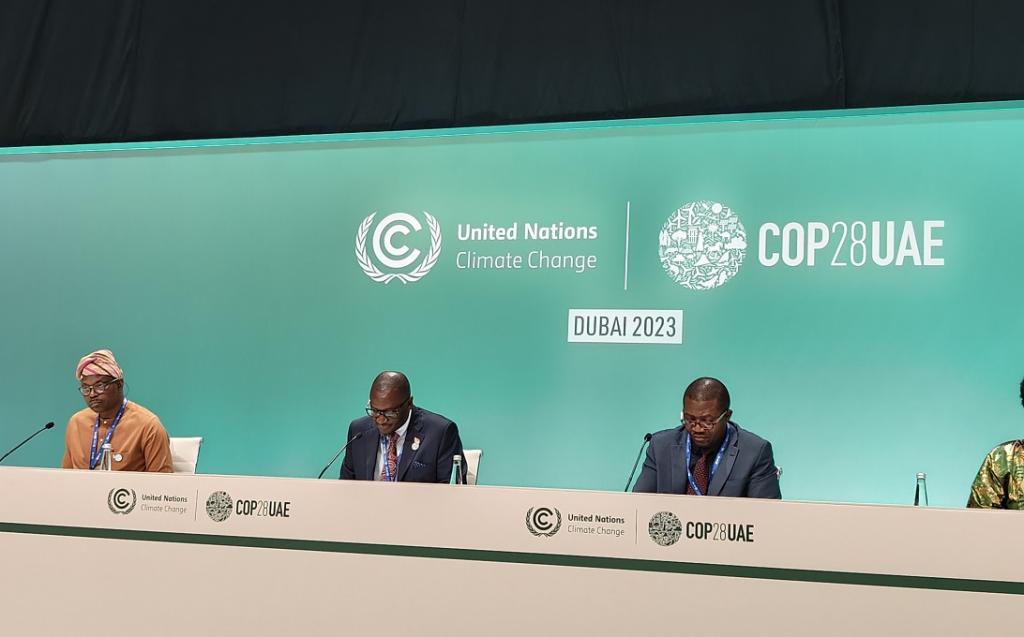

A new text is expected to be out by 6 pm on December 12



The African Group of Negotiators (AGN) put its foot down on the last day of the 28th Conference of Parties (COP28) to the United Nations Framework Convention on Climate Change (UNFCCC) in Dubai. It declared that it won’t agree on any of the other agenda items at COP28 unless its demands on adaptation, especially the Global Goal on Adaptation (GGA) framework, are met.
“We will not agree on anything here unless Africa’s top priorities are met, which to us, is a GGA framework. If we are serious about saving lives, livelihoods, and protecting ecosystems, then the GGA framework must have ambitious, time-bound targets with clear means of support for implementation,” stated Collins Nzovu, Zambian member of Parliament. He is also the country’s minister of green economy and environment.
Nzovu, who is the chair of the AGN group, was speaking at a press conference by the AGN group. The AGN represents all 54 countries on the African continent.
This tough stance on the GGA has not been widely reciprocated by other countries and groups. That is because of the mounting adaptation needs of vulnerable communities across the African continent.
Many African countries have experienced massive floods, deadly tropical cyclones or droughts. The most impactful of these is the long drought in the Horn of Africa, on since 2020. It has pushed around 16.7 million people into acute food insecurity across Ethiopia, Somalia, and Kenya, according to the UNFCCC climate champions website.
A single tropical cyclone — Freddy — had caused damage to infrastructure and agriculture across three different countries in Africa in March this year.
These were Madagascar, Mozambique, and Malawi. The flooding from the cyclone across Malawi and Mozambique had destroyed 300 health centres during a cholera outbreak which brought compounding impacts. Overall, 1.4 million people were affected by the cyclone, according to the World Health Organisation (WHO).
Affected people in the Horn of Africa, as well as the southern countries of Malawi and Mozambique, have to adapt to such impacts. Or else, they may have to face loss and damage.
Time-bound and measurable thematic targets on food and health under the GGA framework along with the means of implementation, including finance, would have helped these countries come up with appropriate adaptation measures to tackle the crises. It would have also helped them keep track of progress towards those targets.
But the latest text of GGA does not have such targets or strong and clear language around means of implementation, especially finance.
Nzovu said at the conference: “We cannot agree at COP28 that the GGA is low in ambition, by having only process-based targets. This is about outcomes and it is about saving lives.”
He further added: “The GGA outcome must address thematic and dimensional targets on equal footing. The targets must be measurable, and time-bound, so we can track progress.”
Nzovu also spoke about the importance of having strong language on GGA in the Global Stock Take (GST), which is a kind of report card of the climate actions taken by various countries to achieve the goals of the Paris Agreement.
The AGN chair also highlighted the need of international public finance from developed countries for taking adaptation measures in light of the fact that African countries have been putting in domestic resources for such measures, despite strained budgets and increasing debt burden.
Nzovu stated: “Africa cannot accept a GGA framework without means of implementation from developed countries for developing countries, especially on the targets.”
The language around means of implementation, especially finance, remains weak in the draft text on GGA from the evening of December 11, with two scary paragraphs added.
He also called for a separate standing agenda item on GGA. Nzovu invited input from the Intergovernmental Panel on Climate Change (IPCC) at a workshop to work on metrics and indicators, in order to measure the progress on the GGA targets.
Although a two-year work programme for the development of metrics and indicators is mentioned in the current text, it does not currently mention who will develop them or how. There is currently no mention of a standing agenda item on GGA in the text.
“I think it is upto rich countries how they respond to the clear priorities set by developing countries, such as the AGN group, to secure a balanced COP28 deal. The framework for the Global Goal on Adaptation with clear targets on both action and financial support is must! Anything less won’t cut it,” Pratishtha Singh, senior international policy analyst, Climate Action Network, Canada, told Down To Earth.
A new text is expected to be out by 6 pm on December 12.
We are a voice to you; you have been a support to us. Together we build journalism that is independent, credible and fearless. You can further help us by making a donation. This will mean a lot for our ability to bring you news, perspectives and analysis from the ground so that we can make change together.

Comments are moderated and will be published only after the site moderator’s approval. Please use a genuine email ID and provide your name. Selected comments may also be used in the ‘Letters’ section of the Down To Earth print edition.